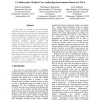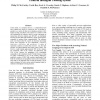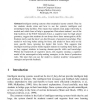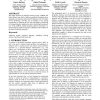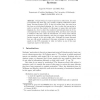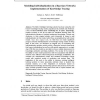EDM
2010
14 years 1 months ago
2010
Intelligent tutoring systems adapt to users' cognitive factors, but typically not to affective or conative factors. Crowd-sourcing may be a way to create materials that engage...
ICALT
2007
IEEE
14 years 2 months ago
2007
IEEE
In this paper, we present a novel collaborative authoring tool that was designed to allow medical teachers to formalize and visualize their knowledge for medical intelligent tutor...
FLAIRS
2007
14 years 2 months ago
2007
In this study, we compared Entailer, a computational tool that evaluates the degree to which one text is entailed by another, to a variety of other text relatedness metrics (LSA, ...
ITS
2000
Springer
14 years 4 months ago
2000
Springer
Intelligent tutoring systems often emphasize learner control: They let the students decide when and how to use the system's intelligent and unintelligent help facilities. This...
ICAIL
2007
ACM
14 years 4 months ago
2007
ACM
This paper describes an intelligent tutoring system, LARGO, that helps students learn skills of legal reasoning with hypotheticals by analyzing oral arguments before the US Suprem...
ITS
1992
Springer
14 years 4 months ago
1992
Springer
One aim of intelligent tutoring systems is to tailor lessons to each individual student's needs. To do this a tutoring system requires a model of the student's knowledge...
ITS
1998
Springer
14 years 4 months ago
1998
Springer
Despite being of crucial importance in Education, the issue of motivation has been only very recently explicitly addressed in Intelligent Tutoring Systems (ITS). In the few studies...
AMT
2001
Springer
14 years 5 months ago
2001
Springer
In the field of guided learning on the Internet we present, in this paper, an interactive tool for designing intelligent tutoring systems on the web. Our tool makes easier the crea...
AIED
2009
Springer
14 years 5 months ago
2009
Springer
We explored the possibility of predicting learners’ affective states (boredom, flow/engagement, confusion, and frustration) by monitoring variations in the cohesiveness of tutori...
UM
2010
Springer
14 years 5 months ago
2010
Springer
The field of intelligent tutoring systems has been using the well known knowledge tracing model, popularized by Corbett and Anderson (1995) to track individual users’ knowledge f...

